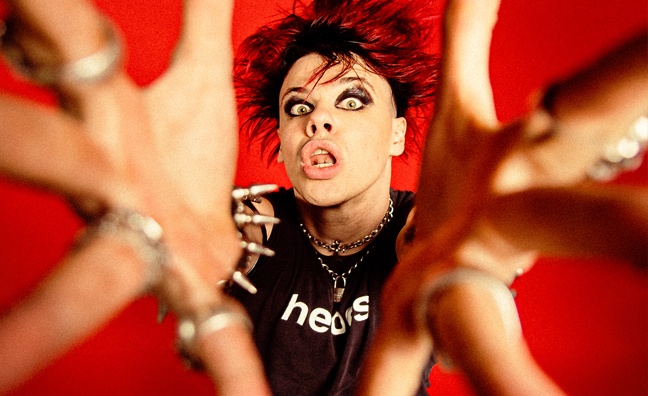Right now, there are few breaking British artists more omnipresent than Yungblud. And with his self-titled third album leading the midweek sales flashes, revisit our digital cover story from 2021 to find out why his chart-topping breakthrough is the ultimate underdog story. Here’s our conversation with the rock’n’roll star, manager Tommas Arnby and former Polydor co-president Tom March…
Words: Charlotte Gunn
Photos: Tom Pallant
Search #bhc on TikTok, and you’ll enter a video vault with over 300 million views, uploaded by kids united in their love of a scruffy-haired, loud-mouthed lad from Doncaster. Sometimes, you’ll see him singing with a fan, other times telling them what garish colour to dye their hair, or scribbling a tattoo for one of them to ink on their arm.
The lad in question is 23-year-old Dominic Harrison, leader of the Black Hearts Club – the online community of misfits upon which the chart-topping phenomenon that is Yungblud was founded.
“Yungblud isn’t me, it’s us,” a very talkative Yungblud tells Music Week from his home in London. “Without these people, I die.”
Over the last four years, Yungblud has been methodically amassing a global army of loyal fans, 100-cap venue by 100-cap venue – first across Europe, then Australia and America and now, the UK. After several EPs and one full-length, he finally has lift-off. His second studio album, Weird!, debuted at No.1 in December 2020, selling 38,759 copies in its first week, according to Official Charts Company data. Yunglud more than held his own at a competitive time for physical releases, eclipsing the week one sales of Paul McCartney, Bob Dylan, Idles, Haim and more.
His impact hasn’t only registered in the charts, either. Werid!’s launch livestream on TikTok attracted 567,879 unique users – the platform’s second-biggest such event of 2020, second only to One Direction’s Liam Payne. Recently launched on BBC Sounds, The Yungblud Podcast has drawn in the largest proportion of under-35s of any pod on the platform. Later this year – Covid permitting – he will perform at Reading & Leeds Festival before heading off on his own headline tour, including huge shows at Alexandra Palace and a homecoming at the Doncaster Dome. Oh, and last month, his cover of his hero David Bowie’s Life On Mars? was heard on actual Mars, after NASA got in touch to say they wanted to play it as the Perseverance Rover landed on the red planet.
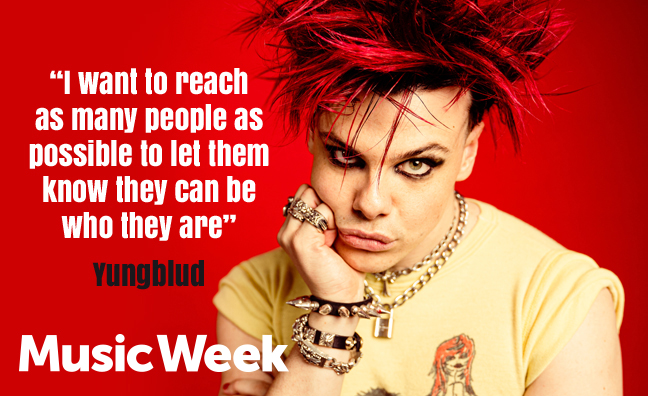
And yet, despite all of this, Britain was slow to catch on.
“I won’t lie, at first I didn’t get it,” laughs Tom March, co-president of Polydor, where Yungblud is signed in the UK. “There’s a lot of Dom, you know? He was as much of a lunatic playing in a pub to five people, the first time I saw him, as he was headlining O2 Academy Brixton. It took me a minute.”
March now describes the artist as the most exciting rock star on planet Earth, but he wasn’t alone in being unsure at first. On first impression, Yungblud is a brash, pouty kid with a righteous, inclusive message. At second glance, he’s still that, but observe the way he communicates with his fans and you start to get it. Yungblud’s superpower is his ability to make friends.
“When I first met Dom, I walked into a songwriting retreat and there he was – this young kid that looked a bit like James Dean, standing on a table, screaming this song,” says Locomotion Entertainment boss, Tommas Arnby, who founded his management and publishing company as a way to work with artists he loved that would never get played on the radio. “The song was terrible, but he was this force of nature. We started chatting, and I was instantly drawn in by his personality, just a bundle of energy, and so sincere. He revealed his frustration at feeling misunderstood. I wondered, ‘What can we do with all that energy, in an artist proposition where that is at the forefront, not tucked away?’ I was ready to do something disruptive, so the timing was right.”

Before meeting his manager, Yungblud had been in the wilderness. Trying to catch a break, he’d play gigs in London that nobody came to and take meetings with record execs who told him he should go on The Voice. “My mum told them, ‘Absolutely not!’” he remembers. “And I was like, ‘Hang on mum, we’re in Virgin EMI, just chill.”
It seemed that nobody understood him.
“It was so hard to get off the ground because rock’n’roll music was completely obsolete, unless it was Radio X, Dad music,” Yungblud explains. “Young people just weren't listening to rock. All the labels would be like, 'Nah, I don't get it. It's a bit of a shit Arctic Monkeys.’ And I'm like, ‘OK, maybe, fair point,’ but I always had an idea for what I wanted to do. I know it sounds mental, but I knew this would happen.”
Arnby’s strategy with Yungblud was to forget the UK and turn the focus elsewhere. He succeeded in getting him picked up by public service radio in the Netherlands and Triple J in Australia. They hit the road, with the aim to build a culture, city by city.
“I will never fucking forget,” says Yungblud, “We played in Shoreditch, in some bar, and two people turned up. Then we got in a van, no sleep, on the fucking ferry and I turn up in The Netherlands and the 150-cap show was sold out, fans camping outside, the way they do now – with their DIY Yungblud T-shirts. I was like, ‘This is so fucking cool.’ I’m literally goosing just thinking about it.”
The trend continued, building momentum across Europe until Yungblud was invited to play School Night – the LA new music showcase that has hosted the likes of Billie Eilish, Haim and Dua Lipa. While in the US, he recorded some tracks at producer Dave Katz’s studio in the Universal Music building in New York. As legend has it, he sent a friend from the Locomotion team (“A little Irish kid called Emmet Power”) running up and down the corridors asking everyone he could find if they had heard Yungblud yet. “You know what A&Rs are like, they sniff something and all come running,” he smiles.
By the end of the summer of 2017, Yungblud had his major record deal, licensed by Arnby’s Locomotion Entertainment to Geffen/Interscope. Yungblud tells a great story about how Interscope CEO John Janick skipped dinner with his wife and rushed across LA to watch Yungblud’s showcase, after Geffen boss Neil Jacobson – who had just met Yungblud and instantly wanted to sign him – sent him a video of the singer performing debut single King Charles in Europe. Yungblud was so nervous, that he threw up before the gig.
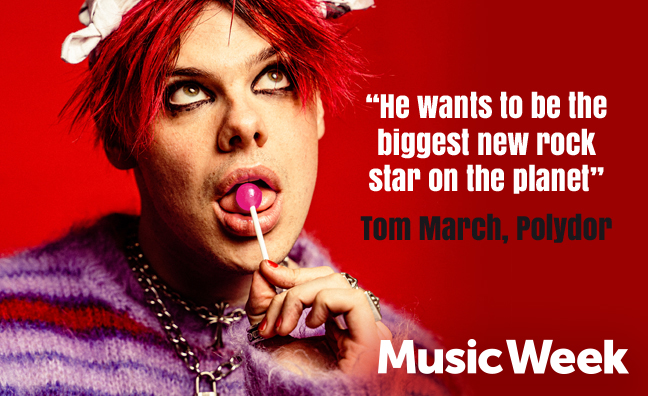
As Yungblud lovingly puts it, Janick was stomping around his office on the phone to Jacobson saying, “‘If this is anything like the video, sign him. I don't give a fuck, sign him!’”
“They gave me a platform to be able to do what I wanted, I could cry when I talk about this,” he says. “I will never be able to thank John for that because it gave me a voice that I never had my whole life. And it just blew from there – they got me magazine covers, I had a platform. I could talk. I could design merch, drop songs and I had a relationship with Spotify.”
Underneath the emotion, Yungblud believes there’s a simple explanation for his explosive trajectory.
“Everyone goes, 'How d'you think you've got so fucking big, so fucking quick?’” he sneers. “Because we're telling the truth. To all the people who don't understand me, it's fine, because I'm not you. Your dad didn't understand Oasis and his dad didn't understand the Stones and his dad didn't understand Chuck Berry. That's rock and roll…”
Tommas Arnby has long been adept at harnessing the mania that courses through everything Yungblud does, and it’s this that drives the business behind Yungblud. The manager knew the UK wasn’t ready for his artist, but he was equally confident that the risk he was taking would come good.
“Yungblud would never have happened, to the extent it has if I had signed him to a UK major, hands down”, says the manager. “What this country is guilty of is, every time the expectations aren’t being met at a pace, it becomes an artist problem or an A&R problem. But actually, we probably just didn’t get the context right. It’s all about context and it’s all about building a culture, the metrics for how we measure success are old-fashioned. British talent doesn't have to break out of the UK first, it just needs to break out of somewhere.”
Arnby, manages Yungblud alongside Locomotion's Gavin Gottlich, says that artist development, for managers, is about “realising that you're not actually in the same business as a major label”.
“What you're doing is building a fanbase, not putting pressure on songs to become massive 100 million-streamers,” he says. “Ultimately, major labels care about priorities and market share, and there's nothing wrong with that. But although it's all the music business, this is different. We're in the fan business, they are in the market share or record business."
It’s as if Yungblud energy, coupled with Arnby’s clarity of thought jolted the music industry into action, forcing it to notice Yungblud’s talent. When Polydor got involved, says Tom March, the aim was to build Yungblud’s story in the UK.
“You could see it happening everywhere he went, he was lighting these fires and fans were coming to him at a really rapid rate,” says March. "We used a lot of that to show the UK, ‘This is happening.’ I've had that before with artists where sometimes they don't completely fit in with the UK sensibilities, and the global story is important for the UK media to really embrace it. We had early supporters at BBC Radio 1 – Jack Saunders really got him and then the rest followed. Dom is a genius. It's one of those great partnerships where management have done a phenomenal job, Interscope have done an incredible job, Polydor as well, and Dom. It's closeness, we've developed a good friendship."
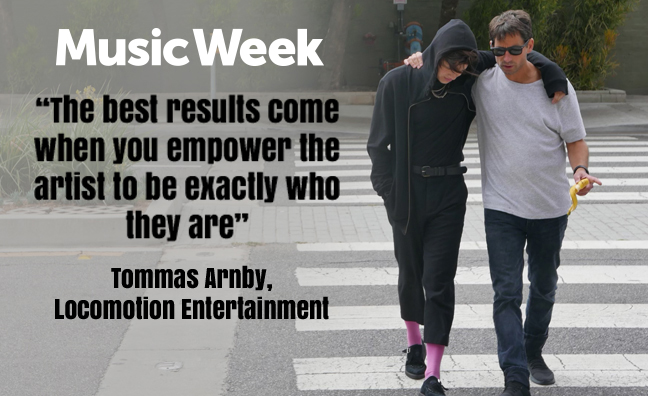
ABOVE: Yungblud (left) with Tommas Arnby
Stick on a Yungblud record and you’ll hear a mesh of Britpop, pop-punk and the occasional emo ballad about sex, self-expression and parents who don’t understand you. Listen closer and you’ll realise that over the course of five EPs, one live album and two studio albums, Yungblud has expanded beyond rock’n’roll. Straddling multiple genres, he’s worked with a list of collaborators that includes Halsey, Machine Gun Kelly, Travis Barker, Bring Me The Horizon, Denzel Curry, Blackbear and more.
His 2018 debut full-length 21st Century Liability has 69,999 UK sales, not bad for a record that didn’t chart. The Underrated Youth EP (33,716) hit No.6 in 2019, before Weird! (57,808) delivered his crowning moment last December. A running total of 9,465,427 monthly listeners are glued to his output on Spotify, where his biggest song is Halsey and Travis Barker collab 11 Minutes (142,974,469 streams). To put that into context, 12 months ago, he had 5,388,640 monthly listeners. Across TikTok, YouTube, Instagram, Facebook and Twitter, he has a combined following of almost 6.5 million. With 3.1m on TikTok alone, his account is in the Top 500 across the entire platform.
Making it about more than just the music has been key to the Yungblud story. As for so many artists, social media has been vital – but Yungblud is willing to give every aspect of himself over to his fans. While locked down in LA, he filmed a documentary series about his life. Then came The Yungblud show: a calamity YouTube talk show, with guests including Kelly Osbourne and Bella Thorne. There was the podcast, where he made his fans the stars, TikTok streams, Instagram Lives. And, he casually tells us, a movie, a new album and a comic book are in the works. More immediately, he's about to release a collaborative single with KSI and Polo G.
“I tell him to come with ideas and he’s like, ‘I’m gonna set myself on fire, I’m gonna smash the screen,’” laughs March. “Then he runs off and says, ‘I’ll do you a PowerPoint.’ Our job is to make the magic happen for him.”
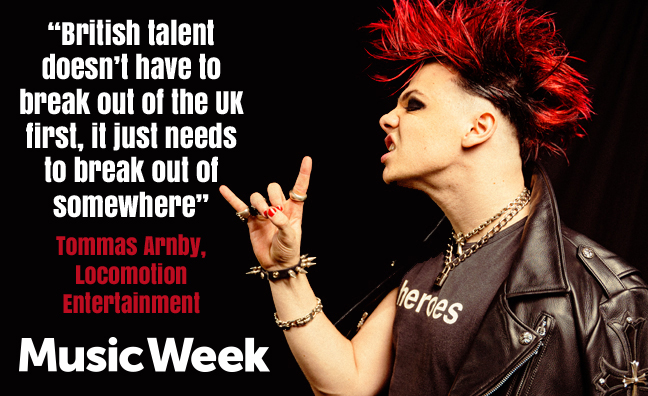
In terms of strategy, it's been a more is more approach, particularly during the pandemic.
"You're never going to beat taking an artist out into the world to perform live and meet their fans," admits March. "Over the last year, you've got to look at the next best thing How can we get to those audiences without being able to go anywhere? Social media is brilliant for connecting to fans directly, to light fires so that when you do travel, you're going to play shows that are twice as big as before. For those artists that have been able to harness that, we put a lot of focus on creating the right content, for different markets, all around the world. Rather than saying, ‘We can't play live and that's fucked,’ you say, ‘How do we embrace the new world?’”
Arnby says that right sync activity early on helped Yungblud get to radio in the US, every drop of coverage led to more and more exposure to Yungblud as a rock star everyone can relate to.
“I've done all of the wrong stuff, where you get too focused on changing what everyone got excited about in the first place when you signed the artist,” Arnby says. “And, I’ve realised that the best results are when you empower the artist to be exactly who they are, and then you clear the space for them to maintain their authenticity and fuel them with confidence to really go there.”
“You have to remember this is literally just the beginning,” says March, of what’s to come. “What he’s achieved already is phenomenal, but he wants to be the biggest new rock star on the planet. We want to win BRIT Awards this year. We want to headline Reading & Leeds Festival, Glastonbury. We’d like a No.1 album in America. It’s all still to come.”
Talking to Yungblud – all hyped up on life and chatting a thousand miles an hour – you get the sense that even if he got dropped tomorrow, Yungblud would carry on. There’s a sweetness and sincerity to him that can get lost in the theatrics of his on-stage persona. But what comes across most as he settles down to talk to Music Week, is an unwavering belief that he can take this all the way…
As a British artist, did it bother you that the UK took a while to catch on?
“Yeah man, I am fucking so proud to be British, and I would watch the BRIT Awards, and be like, 'Oh my God, wow.' I loved everything about British music. And then I was coming up at a time when British music got a bit boring – especially rock’n’roll music. It just got bit fucking leather jacket, and a bit fucking guacamole rock, you know? 10am till 5pm sessions – a bit fucking safe. And I was into Vivienne Westwood. I was into Johnny Rotten and The Clash. I was into The Jam, I was into The Sex Pistols I was into The Stones, all that shit. Tommas had a lot of connections in Europe. So he's like, ‘Listen to me. Fuck the UK for right now. Let's just build a fanbase. It doesn't matter where. And now Belgium is just as important as the UK, Ukraine is just as important as Belgium. Poland is just as important as the Ukraine. The US is just as important as fucking Latvia. Because kids are fucking kids. And culture is culture. That's it.”
You’re a rock star in a time when rock is not necessarily flavour of the month. What does rock’n’roll mean to you?
“Rosa Parks is a fucking punk. ‘Fuck you, white man. I'm not standing up for you.’ It’s freedom and freedom of speech.”
You’ve resonated with vast numbers of kids who didn’t feel like anyone was speaking to them. If there was such an appetite for what you’re doing, how do you think it got missed by everyone else?
“The thing about it is, I spoke to John Janick about it and he said it always gets missed. Because if you’re looking at what’s current now, you’re late. That's why sometimes British music frustrates me because you see the awards shows and you see these acts win who I know, in a year, are not going to be around. That's not a bad thing. But I look at other acts that are so fucking profound and have got fucking bite, that I know could be massive, who just get thrown to the side. But sometimes that’s what makes them big – because they have to fight harder.”
What’s the difference between you and the acts that won’t be around in a couple of years?
“It’s real. And it comes from a place of pain. If you get kicked down, you’ve got to get back up again. If you walk through the battlefield, and you get a nice easy route, when someone hits you in the face, you're never going to get back up. Because you're not taking punches every fucking day. Every time we’re fighting for an award show slot, I’m like, ‘I'm gonna get this because I'm going to use my fanbase to do it.’ I fucking love Radio 1 now because I feel like I've come up with them. But at first they were like, ‘OK, we don't really get it.’ So I thought, ‘I'm going to show you.’ Annie Mac gave me a premiere for the first time so I thought, I'm going to get 700 kids to turn up outside Radio 1. And they were like, ‘What the fuck?’ And now I’ve got a podcast with them, where I'm talking to young kids, broadcast on the BBC.”
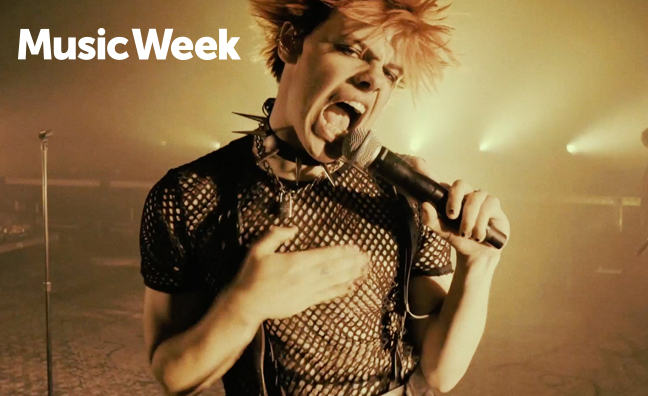
With the podcast, YouTube shows, TikTok and Instagram, it seems like you’re trying to connect with fans through every possible medium?
“That’s it exactly. It’s about connecting people. Punk through positivity. Because punk don’t mean, ‘Let’s get fucked up and fuck you’ and whatever. The thing about it is, I just want to reach people. I want to reach as many people as possible to let them know they can be who they are.”
Can you represent the underdog and still achieve global domination?
“Everyone's an underdog in some respect, that's why I do a million different genres at once. Because when you look at my crowd, yeah, there's the emo kid with red hair but then there's fucking Gaz, who's just in a suit from work. I always tell the story of a trans girl who came up to me in Maryland who inspired my song, Mars – [she says that Yungblud and his music helped her parents accept her as trans]. Then, there’s the guy in Australia, a 35-year-old dude who's lost his wife and his son in a car accident, and puts on my music because it reminds him of when they were together. Know, what I'm saying? That's what Yungblud is. It's not just necessarily like, 'You're fucking different because you wear a skirt' – it's about people. Everyone feels dark sometimes. Everyone feels down and out of place sometimes. But here you can be whatever you are. If that's the emo kid like me, then that's fine. But it’s not just kids dressed as me. If you want to come to my show naked, do it. If you're a fucking policeman and you want to wear your fucking outfit, then come to my show. Because if anyone looks at you wrong, they're not here for the right reason. That's what it's about. That's how the lines cross. Because it's for the unrepresented, yeah. But every single one of us is unrepresented.”
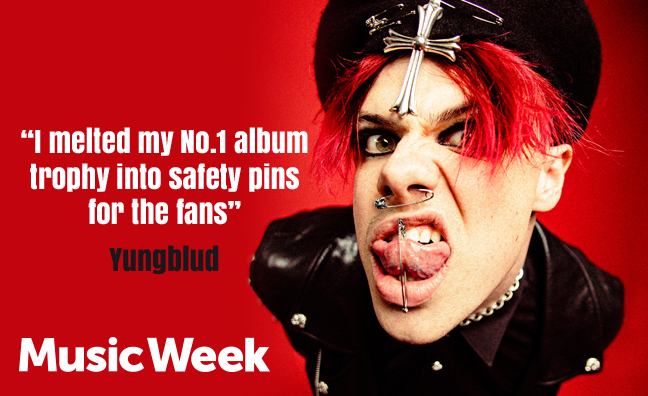
You give so much of yourself to your fans and they share with you in return – but a lot of the topics you talk about with them are quite heavy. Do you feel the weight of that? How do you protect yourself?
“What became beautiful, is that Yungblud isn’t me, it’s us. That's the thing. I get 1,000 DMs a minute. My social media [Instagram] has only got 3.1 million followers but my engagement is through the roof. When I look all these bollocks analytics that the label do, I just think it’s not about me. I have never wanted it to be about me. So it's different. Because if we win an award, it’s our award, when the VMA says Yungblud on it, when the AMA has Yungblud written on it, it’s ours. When I got the No.1 album trophy, I melted it down into safety pins [for fans], because it’s ours. Everything I do is ours because it's about people feeling less lonely. We're about to do our first arena show in Australia and we've never had a Top 10 single there. That’s what I want to change. It's not about songs. It's about culture. If I want to be compared to a modern artist, I want to be Travis Scott or Tyler the Creator. They’ve created a culture.”
What will your next album sound like?
“Mad. Just imagine every single thing I loved about British music all in one. If I took The Smiths, if I took Bowie, if I took the Roses, if I took the fucking Rolling Stones, if I took Oasis and I just did it in a 2021 way.”
Finally, what are your big goals?
“If I was ever to dream to have a career like anyone or just be like anyone – even 20% of it – it would be Bowie, because everyone thinks Bowie was the biggest from... Always. But for his first three albums, nobody got it. My big goals are stadiums all over the world. I'm not going to stop until I do that. I don't want to do two nights at the O2 like everyone else, with kids going to fucking Zizi’s outside. I want to do a Knebworth, or a Spike Island. Where everyone from around the world comes to one place and people look out and go: ‘That’s what it was. That’s what he meant. That was the idea’. To have people come to a show – even if they’re not music fans – just to be a part of something and say ‘I was fucking there.’”
CREDITS:
Photographer: Tom Pallant
Photography Assistant: Adam Wood
Stylist: Davey Sutton
Styling Assistant: Steven Huang
Grooming: Sven Bayerbach
